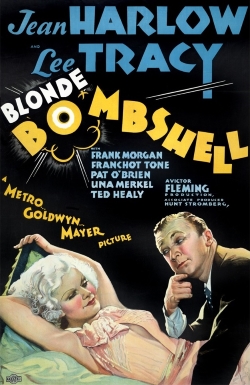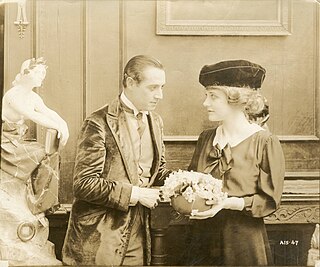
The Public Enemy is a 1931 American pre-Code gangster film produced and distributed by Warner Bros. The film was directed by William A. Wellman, and starring James Cagney, Jean Harlow, Edward Woods, Donald Cook and Joan Blondell. The film relates the story of a young man's rise in the criminal underworld in Prohibition-era urban America. The supporting players include Beryl Mercer, Murray Kinnell, and Mae Clarke. The screenplay is based on an unpublished novel—Beer and Blood by two former newspapermen, John Bright and Kubec Glasmon—who had witnessed some of Al Capone's murderous gang rivalries in Chicago.

Jean Harlow was an American actress. Known for her portrayal of "bad girl" characters, she was the leading sex symbol of the early 1930s and one of the defining figures of the pre-Code era of American cinema. Often nicknamed the "Blonde Bombshell" and the "Platinum Blonde", Harlow was popular for her "Laughing Vamp" screen persona. Harlow was in the film industry for only nine years, but she became one of Hollywood's biggest movie stars, whose image in the public eye has endured. In 1999, the American Film Institute ranked Harlow number 22 on its greatest female screen legends list.

Mae Questel was an American actress. She was best known for providing the voices for the animated characters Betty Boop and Olive Oyl.

Mae Clarke was an American actress. She is widely remembered for playing Henry Frankenstein's bride Elizabeth, who is chased by Boris Karloff in Frankenstein, and for being on the receiving end of James Cagney's halved grapefruit in The Public Enemy. Both films were released in 1931.

Red Dust is a 1932 American pre-Code romantic drama film directed by Victor Fleming, and starring Clark Gable, Jean Harlow, and Mary Astor. It is based on the 1928 play of the same name by Wilson Collison, and was adapted for the screen by John Mahin. Red Dust is the second of six movies Gable and Harlow made together. More than 20 years later, Gable starred in a remake, Mogambo (1953), with Ava Gardner starring in a variation on the role Harlow played and Grace Kelly playing a part similar to one portrayed by Astor in Red Dust.

Double Wedding is a 1937 American screwball romantic comedy film starring William Powell and Myrna Loy, and featuring Florence Rice, John Beal, Jessie Ralph, and Edgar Kennedy. This was the seventh pairing of Powell and Loy, with another seven to go. It was directed by Richard Thorpe from a screenplay by Jo Swerling based on the unpublished play Nagy szerelem by Ferenc Molnár.

Platinum Blonde is a 1931 American pre-Code romantic comedy motion picture directed by Frank Capra, written by Jo Swerling and starring Loretta Young, Robert Williams and Jean Harlow. Platinum Blonde was Robert Williams' last screen appearance; he died of peritonitis three days after the film's October 31 release.

Bombshell is a 1933 American pre-Code romantic screwball comedy film directed by Victor Fleming and starring Jean Harlow, Lee Tracy, Frank Morgan, C. Aubrey Smith, Mary Forbes and Franchot Tone. It is based on the unproduced play of the same name by Caroline Francke and Mack Crane, and was adapted for the screen by John Lee Mahin and Jules Furthman.

Night World is a 1932 American pre-Code drama film featuring Lew Ayres, Mae Clarke, and Boris Karloff. The supporting cast includes George Raft and Hedda Hopper.

Small Town Girl is a 1936 American romantic comedy film directed by William A. Wellman and starring Janet Gaynor, Robert Taylor, and James Stewart. The supporting cast features Binnie Barnes, Andy Devine, Lewis Stone and Edgar Kennedy.

Sally, Irene, and Mary is a 1925 American silent comedy drama film starring Constance Bennett, Sally O'Neil, and Joan Crawford. It is based on the 1922 play of the same name by Eddie Dowling and Cyrus Woods and takes a behind-the-scenes look at the romantic lives of three chorus girls and the way their preferences in men affect their lives. The play was adapted again in 1938, again titled Sally, Irene, and Mary and directed by William A. Seiter. That version stars Alice Faye, Joan Davis, and Marjorie Weaver in the title roles, and co-starred Tony Martin, Fred Allen, and Jimmy Durante.

Hold Your Man is a 1933 American pre-Code romantic drama film directed by an uncredited Sam Wood and starring Jean Harlow and Clark Gable, the third of their six films together. The screenplay by Anita Loos and Howard Emmett Rogers was based on a story by Loos.

The Greeks Had a Word for Them is a 1932 American pre-Code comedy film directed by Lowell Sherman, produced by Samuel Goldwyn, and released by United Artists. It stars Ina Claire, Joan Blondell, and Madge Evans and is based on the play The Greeks Had a Word for It by Zoe Akins. The studio originally wanted actress Jean Harlow for the lead after her success in Public Enemy (1931), but she was under contract to Howard Hughes, and he refused to loan her out. The film served as inspiration for films such as Three Blind Mice (1938), Moon Over Miami (1941), and How to Marry a Millionaire (1953). Ladies in Love (1936) also has a similar pattern and was produced like "Three Blind Mice" by Darryl F. Zanuck.

Safe in Hell is a 1931 American pre-Code melodrama directed by William A. Wellman and starring Dorothy Mackaill and Donald Cook, with featured performances by Morgan Wallace, Ralf Harolde, Nina Mae McKinney, Clarence Muse, and Noble Johnson. The screenplay by Joseph Jackson and Maude Fulton is based on a play by Houston Branch.

The Rise of Jennie Cushing is a 1917 American silent drama film directed by Maurice Tourneur, produced by Famous Players–Lasky, and distributed by Artcraft Pictures, an affiliate of Paramount Pictures. The story based upon the novel The Rise of Jennie Cushing by Mary Watts and stars Broadway's Elsie Ferguson. The film marked Ferguson's second motion picture. It is a lost film.

Husband Hunters is a 1927 American comedy-drama silent film released by Tiffany Productions, directed by John G. Adolfi, and starring Mae Busch, Charles Delaney and Jean Arthur.

Parole Girl is a 1933 American pre-Code romantic drama film directed by Edward Cline. The film stars Mae Clarke and Ralph Bellamy.

Jean Harlow was an American actress who made her uncredited debut in two 1928 films: Honor Bound for Fox Film; and Moran of the Marines for Paramount Pictures. While waiting for a friend at the studio in 1928, she was discovered by studio executives who gave her letters of introduction to casting agencies, where she was offered the two small roles that subsequently launched her film career. During the initial two years of her career, Harlow appeared uncredited in 16 films, including several Hal Roach productions developed for Laurel and Hardy. Her first speaking role was a bit part in the 1929 American pre-Code romantic comedy The Saturday Night Kid, starring Clara Bow and Jean Arthur. The film has since been preserved by the UCLA Film and Television Archive.

The Good Bad Girl is a 1931 American romance film based on a novel by Winifred Van Duzer.

A Parisian Scandal is a 1921 American silent comedy-drama film, directed by George L. Cox. It stars George Periolat, Lillian Lawrence, and Marie Prevost, and was released on December 5, 1921.



















